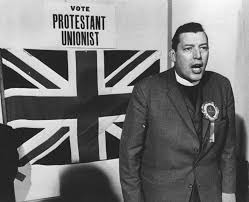The
Context and Development of Irish Literature:
History, Poetry, Landscape
The Northern
Ireland Situation
The border partition in the north created a
Protestant-dominated state as part of Great Britain, composed of
six northern counties: Antrim, Armagh, Down, Fermanagh,
Derry, Tyrone. The careful drawing of the border created a
Protestant majority in these areas. Sir James Craig was
the first Prime Minister from Northern Ireland. Soon the
Protestant-dominated government ensured Protestant control of
all state apparatuses—which in turn ensured continued domination
by the Protestant majority: Catholics were discriminated
against in housing, jobs, education, the courts, and more.
In Ulster the IRA, composed mainly of
die-hard republicans who condemned de Valera’s entry into
government, kept up an inconsistent campaign of resistance
throughout the 1950’s, mainly along the border areas. The
violence had declined somewhat in the early 1960's, and when
Captain Terence O’Neill became Prime Minister of Northern
Ireland in 1963, he tried to initiate some reforms. But the
unionist party found a new energetic spokesman in the Reverend
Ian Paisley (below, circa late 1960's), head of the “Free
Presbyterian Church of Ulster,” who was militant in his
opposition to Catholicism and Irish Nationalism.  Simultaneously, Catholics organized an American-style Civil
Rights campaign that gained momentum through the summer of
1968. The clash was inevitable: in 1968 riots erupt in (London)Derry
and Belfast; in 1969 the use of British troops is sanctioned;
the IRA responds with greater agitation, becoming firmly
entrenched in the Catholic neighborhoods in the cities of Belfast and (London)Derry.
That same year, the Provisional IRA breaks from the official
IRA, in hopes of intensifying the armed struggle with Northern
Ireland and Great Britain. This culminates in 1972: 13
Catholics are shot dead by the British army in (London)Derry
(“Bloody Sunday”); England suspends the NI constitution and
transfers political rule directly to Westminster; later that
summer 9 are killed, 130 wounded by PIRA bombs in Belfast on 21
July (“Bloody Friday”).
Simultaneously, Catholics organized an American-style Civil
Rights campaign that gained momentum through the summer of
1968. The clash was inevitable: in 1968 riots erupt in (London)Derry
and Belfast; in 1969 the use of British troops is sanctioned;
the IRA responds with greater agitation, becoming firmly
entrenched in the Catholic neighborhoods in the cities of Belfast and (London)Derry.
That same year, the Provisional IRA breaks from the official
IRA, in hopes of intensifying the armed struggle with Northern
Ireland and Great Britain. This culminates in 1972: 13
Catholics are shot dead by the British army in (London)Derry
(“Bloody Sunday”); England suspends the NI constitution and
transfers political rule directly to Westminster; later that
summer 9 are killed, 130 wounded by PIRA bombs in Belfast on 21
July (“Bloody Friday”).

Belfast riots, early 1970's
|